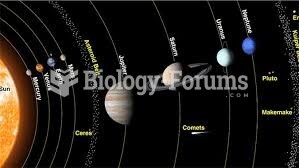|
|
|
Did you know?
Cyanide works by making the human body unable to use oxygen.
Did you know?
Women are 50% to 75% more likely than men to experience an adverse drug reaction.
Did you know?
Signs and symptoms of a drug overdose include losing consciousness, fever or sweating, breathing problems, abnormal pulse, and changes in skin color.
Did you know?
There are more nerve cells in one human brain than there are stars in the Milky Way.
Did you know?
Autoimmune diseases occur when the immune system destroys its own healthy tissues. When this occurs, white blood cells cannot distinguish between pathogens and normal cells.







